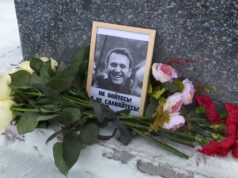As it continues its spiraling, across-the-board decline, the Russian Federation is becoming more relevant as a world power.
This development became most visible when President Barack Obama effectively placed Vladimir Putin in the driver’s seat to resolve the crisis in Syria. The Russian strongman quickly used the opportunity to diminish the U.S. role even further. Somehow, before anyone seemed to realize it, the United States was opening the door to Putin’s protectorate, the Islamic Republic of Iran, in a Cold War redux of economic incentives in exchange for talking about Teheran’s Russian-supplied nuclear weapons program.
Meanwhile, Putin poised Russia to take advantage of the mess in Libya, with the Obama administration struggling to divert attention from the scandal surrounding the 2012 murder of the American ambassador and others in Benghazi.
The Russian leader continues to upstage the American president on the world diplomatic scene. His handlers portray him as virile and physically powerful; a man among men. Young people around the world share laughs at popular social media memes of a buff, shirtless, armed Putin versus a rather effeminate Obama posing cross-legged on “The View.”
“Provocative Weakness”
“Russia’s running out of about everything they need,” former CIA director Michael Hayden tells inFOCUS. “Running out of oil, running out of gas, running out of entrepreneurship, running out of democracy, and most importantly, they’re running out of Russians.”
Yet Putin has managed to place the United States on the defensive across several fronts.
The U.S. leadership’s inept handling of the defection of NSA contractor Edward Snowden further empowered Moscow by showing it can act with impunity. The Putin regime moved carefully to permit Snowden’s request for temporary asylum at a Moscow airport to become a full-fledged defection to Russian intelligence. At that point, the former KGB used Snowden’s stolen classified materials to drive wedges between NATO allies and Washington.
Planted stories—apparently truthful—that the National Security Agency (NSA) had eavesdropped on private conversations of German Chancellor Angela Merkel enabled the Putin regime to splinter confidence between NATO leaders on the European continent with the U.S., Britain, and Canada.
“Our president rushing to make nice just reinforces Putin’s illusion and fantasy that Russia is a great power and it matters as much as it used to,” Hayden adds.
American Foreign Policy Council President Herman Pirchner describes such U.S. behavior as “provocative weakness.” While the U.S. is militarily and economically far stronger than Russia, its weak behavior earns a dangerous contempt that could cause the Kremlin to miscalculate and overstep. Putin has subjected Obama to years of scathing, cutting, personal comments and snubs designed to diminish and humiliate both the American president and the nation as a whole.
Obama “is held in such contempt by Putin that it’s hard to conjure anything that you could put on his TelePrompTer that Putin wouldn’t laugh at,” says a senior retired intelligence officer who asked not to be identified. “I never, ever thought I’d give Putin the benefit of a doubt over a sitting U.S. president,” he added.
By bringing Russia into the Syrian civil war, potentially expanding its role in Iran by entering into Cold War-style arms control talks with Tehran, and passively allowing operatives of the former KGB to drive wedges into NATO, the Obama administration is making Russia a world player again.
“Russia remains important, but I would not try to feed Putin’s fantasy that Russia remains a great power,” Hayden says. “In fact, Russian power is pretty much confined to its ability to say no or to obstruct the actions of others. Russian ability to accomplish something in a positive way is very, very small. It’s the ability to say no. To obstruct.”
Dangers of Miscalculation
“It’s important that President Obama put forth a clear position, whatever that position is, so as not to invite miscalculation,” says Pirchner, who has met with Russian officials on scores of visits and hosted hundreds of Russian officials in the United States. “Russia or other countries might think they could take actions without consequences. Provocative weakness is dangerous.”
Obama has used tough rhetoric on a number of fronts worldwide, and he certainly has backed his words with actions when it comes to killing terrorists. Launching limited drone strikes against individuals in obscure parts of the world is one thing, some Russia watchers say, but they don’t impress the man ruling from the Kremlin.
Putin’s Nuclear Attack Drill
More than any recognized terrorist, Putin is the only person alive with the ability to obliterate the United States. Yet Washington has turned a blind eye toward Russia’s qualitative leap forward in strategic nuclear weapons modernization—especially in land-based intercontinental ballistic missiles (ICBMs) and the submarine-based leg of the nuclear triad.
In October, Putin personally commanded a dramatic practice run of a strategic nuclear attack on the United States. The exercise included the launches of at least one new RS-12M Topol ICBM, an older SS-18 ICBM, and two submarine-launched ballistic missiles (SLBMs). Combined, the four missiles could carry up to 31 nuclear warheads.
“All practice targets were hit,” the Russian government announced.
The White House didn’t say a word. The State Department said the mock nuclear attack was OK, because it was “conducted consistent with the requirements of the New START Treaty.”
Aggressive Probing
Moscow continues to probe the United States and its allies, both to assert itself and to see just how far it can push the American government. Some publicly known incidents include probes into U.S. territory:
- June 2012: Russian strategic nuclear bombers break protocol and conduct maneuvers in the Arctic without alerting the United States in advance.
- July 2012: A Russian Tu-95 Bear-H strategic bomber, capable of carrying nuclear-armed cruise missiles, enters American airspace off Alaska and California. U.S. Air Force interceptors are scrambled to escort the bomber away.
- August 2012: A stealthy Russian Akula-class attack submarine, designed to hunt and sink American strategic ballistic missile submarines, patrols in the Gulf of Mexico for weeks. The U.S. Navy reportedly did not detect the incursion until after the Akula had left the area.
Domination by Intimidation
The main concern with Russia’s nuclear modernization is not so much that Moscow will launch a first strike against the United States, but that it will use its technological nuclear superiority—and a more diverse arsenal of nuclear warheads that makes their use more plausible than an American attack—to intimidate the U.S., NATO, and others.
Combined with its economic grip on much of Europe, which remains heavily dependent on Moscow for energy, the worry is that Russia will make gains without using military force, through intimidation.
A House Armed Services Committee staff memo voices concerns that, “for the first time in seven decades, allies and adversaries will question our ability to provide a nuclear response to an attack,” making the value of U.S. deterrence strategy useless or, in the case of provocative weakness, dangerously inviting to a potential aggressor or miscalculation.
Through energy supplies, financial pressures, threats, and subversion, Moscow is trying to split NATO internally and intimidate certain members of the alliance, while asserting domination over the old Soviet empire.
Intelligence veterans are reviving the old word “Finlandization,” referring to the successful Soviet campaign to intimidate Finland—which put up heroically stiff resistance to a Soviet invasion prior to World War II—into fearful submission.
“Russia’s campaign today would subvert and Finlandize its former colonies, and we’re not paying attention to it as we should,” 20-year CIA veteran Robert Stephan says. “We don’t have the connection with those countries that we had with Western Europe.”
One of the big political battle spaces is Ukraine, where leading anti-Russian politicians have been imprisoned and poisoned. Early in December, opposition protestors toppled the Soviet-era statue of Lenin in Kiev, and calls mount for an end to the corrupt, pro-Kremlin government of Viktor Yanukovich. Most Ukrainians want greater integration with the European Union, but Yanukovich seeks even closer ties with Moscow.
“It’s no secret that Putin wants to reestablish the old Russian empire,” according to Stephan. “Not by military force or treaty obligations, but by Finlandization of all those countries. That’s why they squawked so hard about missile defense in Eastern Europe.”
The Obama administration scrapped plans for a defensive system in Europe capable of shooting down Russian missiles, causing the Czech Republic and Poland to lose confidence in Washington’s will to protect them. “The planned U.S. missile defense system in Europe would have politically neutralized Russia’s nuclear threat,” according to Stephan.
“The other thing that U.S. officials aren’t paying enough attention to, either, is Russian subversion of the European Union,” Stephan adds. “The EU is a serious Russian intelligence target. A good, solid, united Europe is definitely a threat to Moscow.”
Working with Russia on Mideast Problems
In the larger picture, Syria is not a major issue, but could become one without clarity. Some argue that a cooperative but hard-nosed relationship with Russia could use Syria to advance American policy goals in Iran.
John J. Dziak, a senior retired intelligence officer and author of a definitive book on the Russian secret services, says Obama should work with Putin to dampen the Syrian conflagration.
The U.S., Dziak tells inFOCUS, should recognize Moscow’s long-standing interests in Syria and Iran as bulwarks against Sunni Muslim extremism, which he says threaten Russia’s internal stability. Russia sees it in its interests to support Shi’a Muslims, who rule Iran and who, in turn, back the more secular Ba’athist Syrian regime, against foreign-supported Sunni radicals. That might be against U.S. interests, Dziak says, but it is a reality with which the administration must contend.
A mature American presidential approach to Putin over Syria and Iran, Dziak argues, should have Obama tell his Russian counterpart something like this: “I can fully appreciate why you have strategically opted for the Shi’a side in this massive intra-Muslim conflagration. The old adage of ‘the enemy of my enemy is my friend’ makes eminent geo-strategic sense given the geographic and ethnographic cards Russia has been dealt. But zero-sum games between our two countries make no sense in our mutual concern over Muslims intent on recreating a Caliphate that would auger evil for both of us.”
Obama should offer to “back off” Washington’s “implicit, covert, and often open support for the Muslim Brotherhood worldwide,” Dziak says.
The president, he recommends, should say this: “We will also back off from exacerbating the disaster in Syria by not launching demonstration cruise missile strikes. In return, Mr. Putin, you can use your considerable clout with President Assad never to use weapons of mass destruction in the Syrian civil war, and to refrain from any provocations or actual attacks on Lebanon or Israel.”
Finally, Obama should ask Putin to use his leverage to apply negative pressure on Iran’s nuclear weapons program. The end of Obama’s message to Putin, Dziak proposes, should be, “I would ask, sir, that you cease and desist from any material or human technical support to the Iranian nuclear program. This would include any further assistance for the Bushehr reactor.”
That kind of hardheaded diplomacy is unlikely to happen, intelligence experts agree. “This is something everyone is perplexed about,” says a career Department of Defense official. “Why doesn’t U.S. have more visible policy of working with Russia in these flashpoint situations?”
Putin is reveling in his reconstruction of Russia as a superpower, compensating for economic and demographic weaknesses with aggressive, Soviet-style espionage and a high-tech nuclear weapons modernization program. Regionally, Russia is making steady, incremental success at exercising economic and political hegemony over its neighbors in the former Soviet sphere of influence and the Arctic.
Russian Spying Just Like the Cold War Days
Interviews with current FBI and CIA officials show that Russian espionage against the United States remains as intense as during the height of the Cold War, with the leverage of cyberspace. None of those officials would make a statement for attribution, but CIA veteran Stephan voiced a near-universal insider opinion: “I don’t think the American public realizes the extent of Russian espionage.”
“We assess that highly networked business practices and information technology are providing opportunities for foreign intelligence and security services, trusted insiders, hackers, and others to target and collect sensitive U.S. national security and economic data. This is almost certainly allowing our adversaries to close the technological gap between our respective militaries, slowly neutralizing one of our key advantages in the international arena,” DNI James Clapper testified before the Senate Select Committee on Intelligence last March.
Arriving at that state of the art is one of the reasons Russia has been so aggressively stealing technology. It had to move ahead, and quickly.
“They want to spend $770 billion in next 10 years on upgrading their military,” says Stephan. “The key to their greatness is their military and nuclear weapons.”
Strategic Nuclear Weapons Modernization
Russia is continuing a strategic weapons modernization program, underway in fits and starts since the 1990s, to bring next-generation systems online. At the Sevmash shipyard in Severodvinsk, the Russian navy is building the fourth and fifth of its next-generation Borei-class strategic ballistic missile submarines, to be armed with between 16 and 20 of the latest Bulava (Mace) submarine-launched ballistic missiles, each capable of carrying between six and 10 nuclear warheads. According to Russian news organizations, the keel of the sixth Borei sub was scheduled to be laid in November, 2013.
The Borei-class submarine is considered superior to the most advanced American Ohio-class ballistic missile sub. The Bulava missile is a modified version of the SS-27 Topol-M intercontinental ballistic missile (ICBM), still in production, which is more modern than any of its American counterparts.
As a pretentious great power in precipitous decline and with a nationalist leadership empowered by a provocatively weak United States, Russia could become more dangerous than at any time since the darkest days of the Cold War.
All that Putin needs is the confidence that he can keep pushing. U.S. leadership seems to be providing him every reason to stay the course.
Prof. J. Michael Waller is a Senior Fellow at the Center for Security Policy in Washington, D.C., and is President of Oceanic Advisors, a company that provides strategic consulting services to government and private sector clients.





